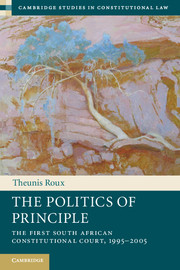Book contents
- Frontmatter
- Contents
- Acknowledgements
- Introduction
- Part I Problematic, Theory, Methodology
- Part II Context
- 4 The political context for judicial review, 1995–2005
- 5 Constraints and opportunities: The law/politics distinction in South African legal-professional culture
- Part III Thematic Case Studies
- Conclusion
- Bibliography
- Index
- References
4 - The political context for judicial review, 1995–2005
Published online by Cambridge University Press: 05 April 2013
- Frontmatter
- Contents
- Acknowledgements
- Introduction
- Part I Problematic, Theory, Methodology
- Part II Context
- 4 The political context for judicial review, 1995–2005
- 5 Constraints and opportunities: The law/politics distinction in South African legal-professional culture
- Part III Thematic Case Studies
- Conclusion
- Bibliography
- Index
- References
Summary
It has become customary in a particular strand of the post-apartheid politics literature to classify South Africa in the first ten years of democracy as a dominant-party democracy. Whether or not this classification is technically correct, the ANC was unquestionably the most important political party in South Africa during this time. Indeed, more than a political party, the ANC was a national liberation movement whose popular appeal transcended any particular policy or political creed. Although its constituency was largely restricted to black South Africans, the ANC drew votes from the urban working class as well as the rural poor, from democratic socialists as well as free-marketeers, from liberal progressives as well as religious conservatives and African traditionalists. The ANC, in short, was a party whose electoral support was unaffected by the cyclical shifts in sentiment that account for the regular rotation of political power in a conventional multi-party democracy.
Given this salient feature of South African politics, this chapter argues, the main determinant of the Chaskalson Court’s insulation from political attack must have been the ANC’s interest in its independence. From 1995 to 1996, that interest was bound up with the Court’s role in stabilising the transition, and particularly its role in certifying the 1996 Constitution. For the transfer of political power to South Africa’s black majority to be properly consolidated, and for the certification process to be seen to be legitimate, the ANC needed an independent constitutional court. After the adoption of the 1996 Constitution, however, this rationale fell away, and the ANC’s interest in the Court’s independence shifted to its role in overseeing the party’s social and economic transformation programme.
- Type
- Chapter
- Information
- The Politics of PrincipleThe First South African Constitutional Court, 1995–2005, pp. 143 - 190Publisher: Cambridge University PressPrint publication year: 2013

